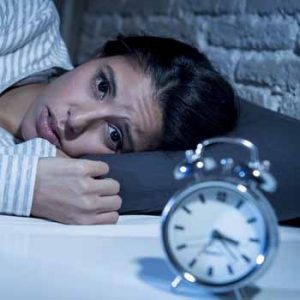
More evidence that low-calorie sweeteners are bad for your health
Studies show that artificial sweeteners can raise the risk of hypertension, metabolic syndrome, type 2 diabetes and heart disease, including stroke.

Natural Health News — A new study found that eating less fibre, more saturated fat and more sugar is associated with lighter, less restorative, and more disrupted sleep.
The small study involved 26 adults – 13 men and 13 women – who had a normal weight and an average age of 35 years.
During 5 nights in a sleep lab, participants spent 9 hours in bed from 10 p.m. to 7 a.m., sleeping for 7 hours and 35 minutes on average per night. Objective sleep data were gathered nightly by polysomnograhy – which records brain waves, oxygen levels in the blood, heart rate and breathing, as well as eye and leg movements.
» A small study has found that what we eat during the day can influence how well we sleep at night.
» The US scientists found that a high fibre diet predicted more deep sleep – the sleep we need to rest and repair, while a high sugar and fat diet was associated with less deep sleep.
» Apart from helping us to make better lifestyle choices the scientists say the finding also has implications for how we treat hypertension, diabetes and cardiovascular disease all of which have links with sleep quality.
How well the participants slept was measured first after 3 days of controlled feeding in which they consumed a healthy low fat diet, and then again on night 5, after one day when participant were encouraged to eat when and what they wanted.
Rest and repair
Results published in the Journal of Clinical Sleep Medicine showed that greater fibre intake predicted more time spent in the stage of deep, slow wave sleep. In contrast, a higher percentage of energy from saturated fat predicted less slow wave sleep. Greater sugar intake also was associated with more arousals from sleep.
Slow wave sleep, sometimes referred to as ‘deep sleep’ allows the brain to recover from its daily activities. It is thought to be vital for imprinting and consolidating new memories. It’s good for the body too since this is the time that hormones and other chemicals are released into the bloodstream that help control cellular repair, glucose metabolism and appetite.
The study also found that participants fell asleep faster after eating fixed meals provided by a nutritionist, which were lower in saturated fat and higher in protein than self-selected meals. It took participants an average of 29 minutes to fall asleep after consuming foods and beverages of their choice, but only 17 minutes to fall asleep after eating controlled meals.
Diet and sleep work together
Principal investigator Marie-Pierre St-Onge, PhD, assistant professor in the department of medicine and Institute of Human Nutrition at Columbia University Medical Center in New York, NY noted “It was most surprising that a single day of greater fat intake and lower fibre could influence sleep parameters.”
The study underscored the fact that diet and sleep two sides of the same coin when it comes to a healthy lifestyle – and that both are influenced by our own lifestyle choices.
According to the authors, the study suggests that diet-based recommendations might be used to improve sleep in those with poor sleep quality. But the implications may go beyond that.
“The finding that diet can influence sleep has tremendous health implications, given the increasing recognition of the role of sleep in the development of chronic disorders such as hypertension, diabetes and cardiovascular disease,” said St-Onge.

Please subscribe me to your newsletter mailing list. I have read the
privacy statement